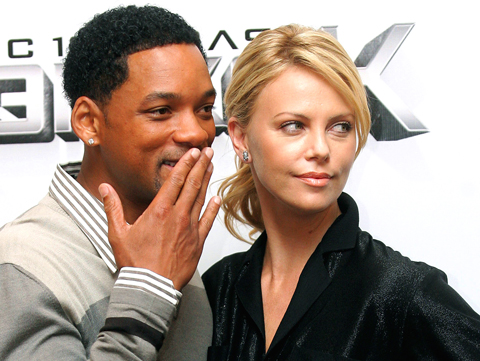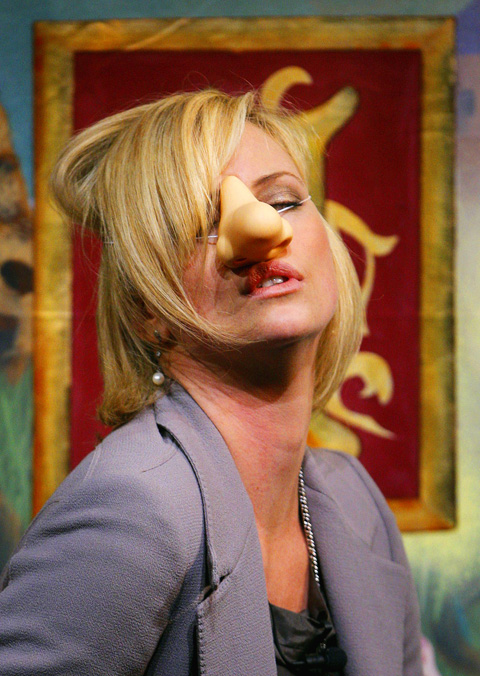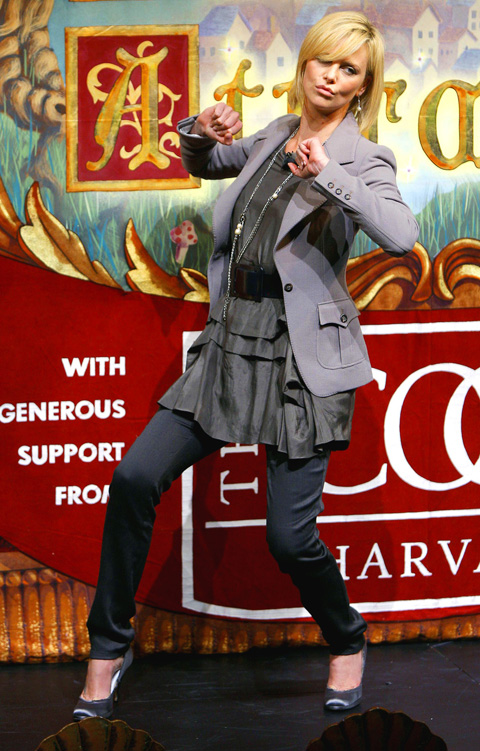When Charlize Theron appears on screen in her new film, Hancock, it’s as the archetypal soccer mom, a vision of all-American apple-pie goodness, blonde and peachy, wearing a look of tender concern towards her blonde and peachy son. She looks as if she was born for the part, raised on a diet of milk and cookies in the suburbs before setting off for Hollywood. Which just goes to show. She has the looks and the accent, but English isn’t even her first language; she’s actually an Afrikaner from small-town South Africa. She grew up under apartheid. When she was 15 years old, her mother gunned down her alcoholic father on the family smallholding after he turned violent.
So much for soccer mom. But then Theron’s cheesecake looks are always a bit of a red herring. She’s known for her beauty — how could she not be? When she walks into a room she reduces everyone else to hobbits — but she’s better known for her acting. Her looks marked her out for a lifetime of girlfriend roles, like those she played in The Cider House Rules or The Italian Job, but then in 2003 along came Monster and an Oscar for her terrifying portrayal of serial killer Aileen Wuornos.
At times, talking to her, it feels as she’s a double agent in deep cover. As if there’s not one Charlize Theron, but at least two, if not a few more. Even her choice of films seems like the Charlizes are all in conflict with one another. Her recent appearances have been in small indies on politically contentious topics — In the Valley of Elah, about returning soldiers from Iraq, Battle in Seattle, about the anti-globalization riots, and Sleepwalking, about a woman who abandons her child.

PHOTO: AGENCIES
And now there’s Hancock, a major studio picture starring perhaps the most major studio star around, Will Smith, as an antisocial superhero. It’s all set to be this summer’s blockbuster — which makes it sound like dross, whereas it’s actually smart and funny, but about a million times more commercial than anything she’s done in recent times.
You keep your audience guessing, I tell her. “I keep myself guessing. I get bored so quickly. I just really liked the material. And the girl was cool. I wasn’t ticking any boxes. I just try and do good material and how it gets made is secondary ... And anyway, it’s really nice to get a decent paycheck.”
It sounds like she’s unlikely to make a habit of it, though. “I do like the challenge of finding material that people don’t want to risk a lot of money on and that studios don’t necessarily jump to go, ‘Yeah! We want to tell that story.’ And how could I not after I had done something like Monster? Everybody wondered how a movie like that could be successful.” Monster is still the touchstone of her career. With the help of prosthetic teeth and Latex skin, she made the character of Aileen Wuornos her own; a woman who was beaten, raped, abused and went on to exact brutal revenge against men as a serial killer.

PHOTO: AGENCIES
It could so easily have never happened. Theron would have continued playing the types of roles she had before — a supermodel in Woody Allen’s Celebrity, the love interest in The Legend of Bagger Vance. That she didn’t is down to an unknown director, Patty Jenkins, who sent her the script for Monster.
“I never got offered parts like that, never. And it took a woman, a first-time female director to offer me that role. Paul [Haggis — the director of Crash and In the Valley of Elah] recently said to me, ‘You know, often it’s the material that will define an actor, but you didn’t do that. You defined yourself with what you chose to do.’ And I thought that was a nice compliment.”
Theron not only took the part, she also co-produced Monster, put her own money into it and agreed to work for free. Jenkins says she wanted Theron because there was a ferocity to her.

PHOTO: AGENCIES
“I could see from a distance that she was not someone who you’d want to mess with. A lot of the women I met with, who were also incredibly talented actors, had a much sweeter, softer side. But I think Aileen became incredibly strong and disciplined and macho, so an inability to deal with confrontation would never have worked.”
Theron’s South African childhood helped create her discipline and strength, something that quickly becomes apparent when she describes her early years: “I was trying to make the correlation between Aileen Wuornos and her experiences when she was very young. And I was reminded of something that happened to me. I was five years old and we were driving ... all the cars stopped because a truck had rolled over and was ablaze. The doors were jammed and there was a man trapped inside. In South Africa everybody carries a weapon and the man begged for someone to shoot him because he didn’t want to burn to death. Nobody could get him out of the cab, so somebody shot him. It was horrific, but definitely a moment that made me have a great value for life. Other things in life have taught me not to take a moment for granted.”
The “other things” almost certainly include the death of her father, shot in self-defense by her mother, Gerda. His drinking, she says, was just considered normal. “You know, people drank. Some people drank more, but it was never considered that this might be a problem. It was just the way it was then.”
Gerda was never charged for the murder and she encouraged her daughter to leave the country almost as soon as she turned 16. Theron went on a modeling assignment to Europe and never went home. These days, her mother lives near her in the US. They speak Afrikaans together, their mother tongue, although, Theron says, she dreams in both languages.
She’s been involved with various South African charities, sponsoring an AIDS clinic, a DNA laboratory and anti-rape advertisements. She campaigns for animal rights, too, and owns a handful of rescue dogs. In one interview, she described Wuornos as a “stray dog.” I ask her if she’s read J. M. Coetzee’s Disgrace.
“Oh, the ending!” she says referring to a scene in which the main character is forced to kill all the dogs in a rescue pound. There’s something about the novel, about its descriptions of the violence and brutalization of South African society, and redemption from the past, that seems to mirror something of her own experience.
Theron grew up in the small farming town of Benoni and politics were all around from the first moment she can remember. After she won the Oscar, she was welcomed back in South Africa as a returning hero. Nelson Mandela, who she describes as “like a grandfather to me,” thanked her for putting South Africa on the map, while Thabo Mbeki, the president, claimed that “her personal life represents a grand metaphor of South Africa’s move from agony to achievement.”
It is quite a claim and Theron doesn’t accept it.
“I don’t think I want to be a pinup for anything! The people who inspire me are the ones who just live life and live it in a way that’s good-natured. Do unto others what you want done unto yourself. It’s not that hard. Don’t screw people over. Enjoy life, travel, adventure. Enjoy.
“I try to just live my life in as good and authentic a way as possible. And I just wish people would write about that and the matter-of-fact way that that is, rather than: ‘On a summer’s day, her mother shot her father.’ It’s like I walk around with this badge.”
I try to say something at this point, but Theron is not to be interrupted. “I live my life the way I want to live my life. It’s like I have chosen this life. I want to be able to go to sleep at night and feel that I’m not haunted and I’m happy and I enjoyed my day in London and that I enjoy my friends and my love, and that if this is all gone tomorrow, like that man who died so horribly in front of me when I was five, that it was good.”
Phew. It’s quite a speech and I’m beginning to see what Jenkins means about her ferocity. A lot of the interviews I’ve read with Theron have been written by men who can’t quite get over her astonishing beauty, or if they do it’s to note her “salty language” and ability to take a joke — which, combined with her astonishing beauty, only makes them salivate more. How pathetic, I think, as I read yet another article that has the writer finding it “intoxicating” being with “this breathtakingly glamorous woman.”
But the fact is, Theron has the sort of charisma that works not just on men but on women, too, and in all probability the beasts of the field and birds of the sky. I find myself thinking that she has the most charmed life of anybody I’ve ever met. Which isn’t usually how you’d describe someone with her sort of upbringing. And anyway, she makes the point that, “I don’t believe in charmed lives. I think that tragedy is part of the lesson you learn to lift yourself up, to pick yourself up and to move on.”
Which she has done by sheer force of character and it’s that which makes her so attractive. She’s got a new accent, even a new country — she became an American citizen earlier this year (she’s retained dual citizenship, but she wants to be able to vote in the US) — and she just seems to have such a wholehearted appetite for life, which might just be talk, but when she recalls a recent camping trip to Maui she’s so enthusiastic that it leaves you thinking: hmm, I wonder how much the flights are.
She seems to have the same effect on other people. The writer-director Paul Haggis, who’s known her since she first arrived in Los Angeles, wrote a film especially for her, In the Valley of Elah, which prompts another outburst. When it came to answering questions from the press, she became exasperated that they focused on the fact that she had “transformed” again, although this time it only involved letting her hair color grow out and wearing a ponytail.
“It just bummed me out because I was, ‘What do you want?’ Do you want me to play a detective from Albuquerque who’s a single mom in a Dior dress?”
But isn’t it hypocritical that when it comes to having an ugly woman in a film, people still need to know that it’s OK, it’s actually a beautiful Hollywood actress up there?
“No, I think it’s the opposite to that. The way they focused on my appearance, I felt like it hurt that film and I was embarrassed because Paul had worked really hard and just because I had a ponytail that’s what they were talking about.”
The funny thing is that she resents the emphasis on her physical transformation, rejects the notion that she’s attracted to stories that involve it, and yet her whole life is a testament to the very concept. Her life, as she points out to me twice, is not the one she was born to, it’s the one she has chosen.
And then she’s off again, this time on the madonna-whore complex. “People just aren’t willing to see conflict, or ugliness or the more flawed side of life through a female character’s eyes. I mean, can you imagine a woman playing Travis Bickle in Taxi Driver? When Robert De Niro does it, it’s fine, [but] people are very uncomfortable about seeing that through a woman’s eyes. We aren’t allowed complexity.”
Maybe she’s the living rebuttal of that, though. She takes on the sort of roles Jodie Foster played a decade or so ago, and is quite happy to speak out on women’s rights and injustice but she’s equally happy to take off her clothes and pose for the camera, having done photo spreads for the likes of Playboy and Barely Legal. She’s in this month’s GQ in a set of black-and-white, soft-core pictures — the caption detailing where her clothes come from necessarily brief. “White sheet by Ginger Lily,” it says, “£145.”
It’s interesting, I say to her, that in her work she often takes parts where she’s working against her looks, but in life, she’s quite happy to showcase them.
“Well guess what? I’m a sexual creature. There’s nothing wrong with that. Why do we have to be ashamed of being so many different things? Why do we have to be only one thing, a good mother or a hooker? I don’t think that what’s under my clothes is evil. I’m a woman, I’m feminine. And I like the way I look. And I celebrate that. And I don’t make excuses for that.”
I believe her, but the other thing that occurs to me is that it’s a distancing mechanism. A sort of “look but don’t touch” approach. When I ask her if there would ever be a film made of her life, she looks truly appalled — the idea of being revealed in any way, anathema.
“God I hope not. I’ve been working harder than anything in my life to try and keep my life sacred. I really don’t mind when I’m in front of a camera and playing a character I’m comfortable with ... but I don’t necessarily like the spotlight to be about me — not at all. The idea of sitting in Cannes and watching that ... ugh. No.”
It’s a shame, because it’s got all the key ingredients you need for a Hollywood film: triumph over adversity, hope over experience, and a beautiful woman in the leading role. No prosthetic teeth or ponytail required.
Hancock is released on Friday. See that day’s Taipei Times for a review of the film.

The Democratic Progressive Party (DPP), Chinese Nationalist Party (KMT), and the country’s other political groups dare not offend religious groups, says Chen Lih-ming (陳立民), founder of the Taiwan Anti-Religion Alliance (台灣反宗教者聯盟). “It’s the same in other democracies, of course, but because political struggles in Taiwan are extraordinarily fierce, you’ll see candidates visiting several temples each day ahead of elections. That adds impetus to religion here,” says the retired college lecturer. In Japan’s most recent election, the Liberal Democratic Party lost many votes because of its ties to the Unification Church (“the Moonies”). Chen contrasts the progress made by anti-religion movements in

Last week the State Department made several small changes to its Web information on Taiwan. First, it removed a statement saying that the US “does not support Taiwan independence.” The current statement now reads: “We oppose any unilateral changes to the status quo from either side. We expect cross-strait differences to be resolved by peaceful means, free from coercion, in a manner acceptable to the people on both sides of the Strait.” In 2022 the administration of Joe Biden also removed that verbiage, but after a month of pressure from the People’s Republic of China (PRC), reinstated it. The American

Chinese Nationalist Party (KMT) legislative caucus convener Fu Kun-chi (傅?萁) and some in the deep blue camp seem determined to ensure many of the recall campaigns against their lawmakers succeed. Widely known as the “King of Hualien,” Fu also appears to have become the king of the KMT. In theory, Legislative Speaker Han Kuo-yu (韓國瑜) outranks him, but Han is supposed to be even-handed in negotiations between party caucuses — the Democratic Progressive Party (DPP) says he is not — and Fu has been outright ignoring Han. Party Chairman Eric Chu (朱立倫) isn’t taking the lead on anything while Fu

Feb 24 to March 2 It’s said that the entire nation came to a standstill every time The Scholar Swordsman (雲州大儒俠) appeared on television. Children skipped school, farmers left the fields and workers went home to watch their hero Shih Yen-wen (史艷文) rid the world of evil in the 30-minute daily glove puppetry show. Even those who didn’t speak Hoklo (commonly known as Taiwanese) were hooked. Running from March 2, 1970 until the government banned it in 1974, the show made Shih a household name and breathed new life into the faltering traditional puppetry industry. It wasn’t the first